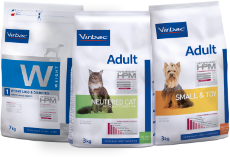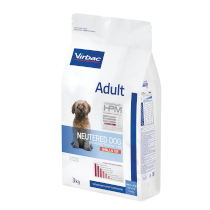Adult Neutered Dog Small & Toy
Neutered dogs are predisposed to becoming overweight, and often exhibit an increased appetite. VETERINARY HPM® responds to your small breed neutered dog’s specific needs.
Complete diet for neutered adult dogs of small breeds (<10kg), over 10 months old or those with a tendency to become overweight
- Body weight control: controlled energy density
- Moderate calorie level: reduced level of fat and increased level of fibre
- Dental tartar control: help the limitation of tartar formation
Available sizes:
- 1,5 kg
- 3 kg
- 7 kg
Nutrion for carnivorious paragraph
Composition :
Dehydrated pork and poultry proteins, Rice (min. 4%), Lignocellulose, Hydrolysed pork and poultry proteins, Faba bean hulls, Animal fats, Peas, Potato starch (min. 4%), Linseed, Minerals, Beet pulp, Psyllium fibre (Plantago (L.) spp.), Fructo-oligosaccharides, Brewers yeast (source of betaglucan), Lactobacillus acidophilus, Chondroitin sulphate.
VETERINARY HPM® does not contain any artificial colours or flavours.
Analytical constituents :
(% as fed)
| Analytical Constituents (% as fed) |
|
|---|---|
| Moisture | 9 % |
| Protein | 34 % |
| Animal to vegetal protein ratio | 86/14 |
| Fat | 13,5 % |
| Minerals | 7,5 % |
| Crude Cellulose | 10,5 % |
| NFE * | 25,5 % |
| Starch | 18 % |
| Calcium | 1,3 % |
| Phosphorus | 1,1 % |
| Omega-6 | 2,2 % |
| Omega-3 | 0,9 % |
| ME** calculated | 315 kcal/100g |
| ME** measured in vivo | 317 kcal/100g |
| * Nitrogen Free Extract: Carbohydrates ** Metabolisable energy |
|
| Functional Ingredients | |
|---|---|
| Bentonite | 5 g/kg |
| Killed Lactobacilli | 7 mg/kg |
| L-carnitine | 330 mg/kg |
| Pentasodique Triphosphate | 0,7 % |
| Added Vitamins and trace elements | |
|---|---|
| Vitamin A | 11 000 IU/kg |
| Vitamin D3 | 1 100 IU/kg |
| Vitamin E | 570 mg/kg |
| Vitamin B1 | 3,8 mg/kg |
| Vitamin B2 | 11 mg/kg |
| Vitamin B3 | 30 mg/kg |
| Vitamin B5 | 26 mg/kg |
| Vitamin B6 | 3 mg/kg |
| Vitamin B9 | 0,48 mg/kg |
| Vitamin B12 | 0,062 mg/kg |
| Choline | 740 mg/kg |
| Taurine | 1 500 mg/kg |
| Copper | 15 mg/kg |
| Iron | 25 mg/kg |
| Iodine | 1,1 mg/kg |
| Zinc | 120 mg/kg |
Il est conseillé de suivre le tableau de rationnement et de mettre à disposition de l’eau fraîche.
| Poids du chien (kg) | Ration quotidienne (g/jour)* | ||
|---|---|---|---|
| Peu actif | Activité normale | Très actif | |
| 1 | 35 | 40 | 40 |
| 2 | 55 | 60 | 65 |
| 3 | 70 | 80 | 90 |
| 4 | 85 | 95 | 105 |
| 5 | 100 | 115 | 125 |
| 6 | 115 | 125 | 140 |
| 7 | 125 | 140 | 155 |
| 8 | 140 | 155 | 170 |
| 9 | 150 | 165 | 185 |
| 10 | 160 | 180 | 195 |
| * Ces quantités restent indicatives et peuvent varier en fonction de la race du chien. Pour plus de précisions, veuillez consulter votre vétérinaire. | |||

- Can I feed my puppy with a home-made diet?
The food that puppies receive throughout their first year must obviously provide energy and materials to build the skeleton, muscles, and all new tissues. But nutrition does not stop there, it must also help puppies develop a fully functioning nervous system and effective immune system. Any deficiency in essential nutrients (those which cannot be synthesized by the animal's body) during this very delicate period may affect the dog's future health.
Many recipes developed by veterinary nutritionists are available for owners who wish to prepare a nutritionally balanced home-made diet for their puppy dog food needs. However, it is illusory to succeed in respecting all the required conditions because the nutritional balance of a household ration is subject to various hazards. The owner will always find it difficult to follow the recipe exactly, the necessary ingredients are not always available, and the nutritional composition of the ingredients can vary considerably depending on the origin of the product. When preparing a home-made diet, no laboratory analysis can verify the nutritional composition of the raw materials used!
Therefore, even when accompanied by the distribution of a mineral and vitamin supplement, home-made diets for dogs often show deficiencies in some essential nutrients. For a safer and more balanced alternative, consider feeding your pet a high protein food for puppies designed to support proper development. Commercially prepared dry puppy food options are often the best puppy dog food choices for consistency and reliability.
- Can I feed my puppy with a vegetarian diet?
The dog is a carnivore, which means that certain nutrients it needs cannot be provided by a plant-based diet. Such diets can cause major nutritional deficiencies with serious consequences on health. For this reason, a puppy should never be fed a vegetarian diet. Instead, opt for puppy dog food that meets its natural dietary requirements—particularly high protein food for puppies in a dry puppy food form that is considered among the best puppy dog food options.
- Can I feed my puppy with raw meat diets?
Raw meat diets (red meat or chicken) are often deficient in calcium and phosphorus. The Calcium/Phosphorus ratio is totally inappropriate for the canine species, especially in terms of bone growth. Such a diet can cause major nutritional deficiencies with serious consequences on health. For example, when fed exclusively a raw meat diet, the puppy is exposed to the risk of pathologic fractures following minor trauma.
To avoid these risks, it is advisable to feed your pup a scientifically balanced dry puppy food. These formulas are designed as high protein food for puppies and are considered by many veterinarians as the best puppy dog food to ensure long-term health and development.


